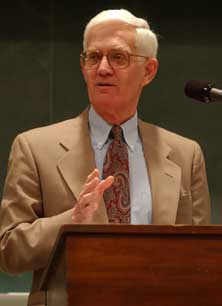 Historian David Potts |
Scholars from around the country gathered at the Center of Inquiry to discuss the fundamental elements necessary in a liberal arts education. To kick start their proceedings, Potts gave a bit of a history lesson in his keynote address, which dealt with a rift that developed between Yale and Amherst colleges in the mid -1820s.
At that time, colleges faced many threats: endowments were small, student tuition was essential for survival, competition from new entrants was growing, trains were opening new markets, and the growth of the republic was creating new needs.
Potts suggests that in the 1820's all "colleges faced uncertainty. They could choose to redefine or redesign." Some colleges, such as Amherst, sought to redefine themselves by offering a more practical course of study. According to Potts, "Amherst portrayed current colleges as stationary and not meeting the wants and demands of an enlightened public." Amherst chose to redesign its undergraduate program to include a degree that did not require Greek or Latin and focused on more 'practical' fields of study, such as engineering.
These changes in the higher education landscape forced Yale to evaluate its own approach to undergraduate education. In 1828, Yale rebutted this 'innovation' in higher education, arguing that 'mental discipline' was an essential outcome of an undergraduate education. Administrators at Yale found that "mental discipline occurs when the intellectual faculties are developed through daily and vigorous exercise in a broad range of studies," according to Potts.
 Yale's Branford Courtyard |
Yale's argument met with popular approval, and efforts by new colleges to move away from a liberal arts education were slowed.
"Today's liberal education, especially as professed in the undergraduate college, is heir to Yale's Reports through a line of important educational intellectuals," says Potts.
Potts believes that Yale's concept of mental discipline and its conceptual successor, critical thinking, remain a key criterion of a liberal arts education.
"There is much at stake in the perennial contests for curricular space and requirements," Potts concludes. "This may be a propitious time to revisit the notion of critical thinking. It may also be a good time to explore the notion of a curriculum that is "best calculated" to develop such intellectual skills. In both enterprises we would take a close look at curricular content and the teaching process. Above all, however, we would be well advised to examine the relationship between these two fundamental aspects of liberal education."
For more information see: